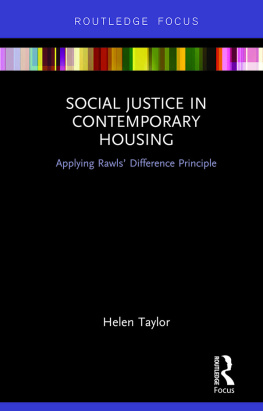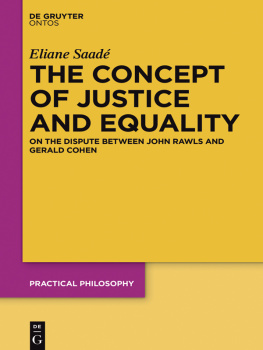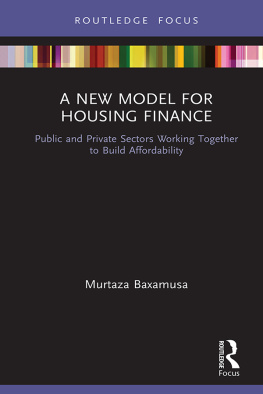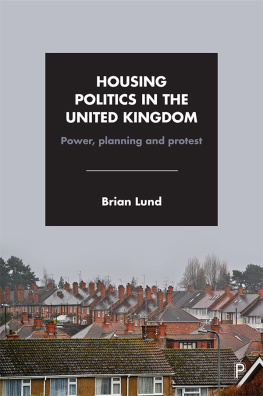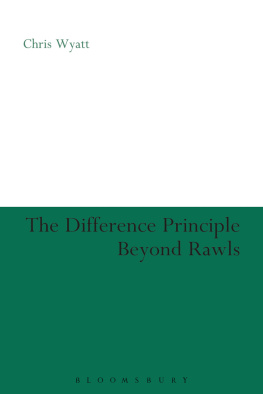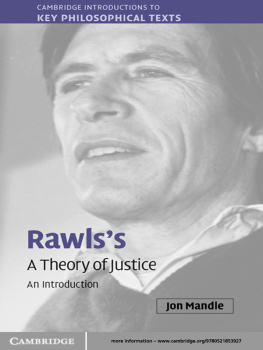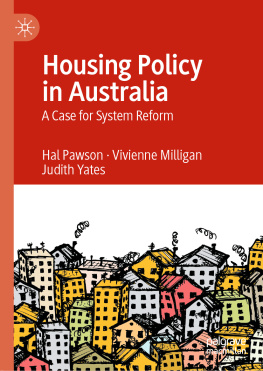Social Justice in Contemporary Housing
Philosophy is not usually seen as a guidance for modern housing policy, but in this new book, Dr Helen Taylor argues that there is something innovative, unusual, and worth discussing about the application of philosophy to housing. The philosophical framework used within this book is John Rawls conception of justice as fairness. The UK has gone through several shifts in housing policy over the past decade, most recently by introducing the controversial Bedroom Tax, in an effort to make more cuts to benefits and social welfare.
Social Justice in Contemporary Housing: Applying RawlsDifference Principle suggests that by using ideas of agency, we can understand the impact that social policy has on individuals and wider society. The work outlines the liberal principle of legitimacy and argues that Rawls concept of reasonableness can, and should, be used to justify the intervention of policy in individuals lives. This book will be of interest to undergraduate and postgraduate students of housing as well as philosophy and social policy, and also those working around the creation and implementation of social housing in the UK.
Helen Taylor is a lecturer in housing studies at Cardiff Metropolitan University, UK. She is Communications Officer for the Housing Studies Association, as well as a board member for housing sector organisations Newport City Homes and Cymorth Cymru, and sector publication Welsh Housing Quarterly.
Routledge Focus on Housing and Philosophy
Routledge Focus offers both established and early-career academics the flexibility to publish cutting-edge commentary on topical issues, policy-focused research, analytical or theoretical innovations, in-depth case studies, or short topics for specialized audiences. The format and speed to market is distinctive. Routledge Focus are 20,000 to 50,000 words and will be published as eBooks, and in Hardback as print on demand.
This book series seeks to develop the links between housing and philosophy. It seeks proposals from academics and policy-makers on any aspect of philosophy and its relation to housing. This might include ethics, political and social philosophy, aesthetics, as well as logic, epistemology, and metaphysics. All proposals would be expected to apply philosophical rigour to the exploration of housing phenomena, whether this be the policy-making process, design, or the manner in which individuals and communities relate to housing. The series seeks an international and comparative focus and is particularly keen to include innovative and distinctly new approaches to the study of housing.
Please contact Peter King () with ideas for a book proposal or for further details.
Books in the series:
Thinking on Housing
Words, Memories, Use
Peter King
Social Justice in Contemporary Housing
Applying Rawls Difference Principle
Helen Taylor
Place and Identity
Home as Performance
Joanna Richardson
First published 2019
by Routledge
2 Park Square, Milton Park, Abingdon, Oxon OX14 4RN
and by Routledge
711 Third Avenue, New York, NY 10017
Routledge is an imprint of the Taylor & Francis Group, an informa business
2019 Helen Taylor
The right of Helen Taylor to be identified as author of this work has been asserted by her in accordance with sections 77 and 78 of the Copyright, Designs and Patents Act 1988.
All rights reserved. No part of this book may be reprinted or reproduced or utilised in any form or by any electronic, mechanical, or other means, now known or hereafter invented, including photocopying and recording, or in any information storage or retrieval system, without permission in writing from the publishers.
Trademark notice: Product or corporate names may be trademarks or registered trademarks, and are used only for identification and explanation without intent to infringe.
British Library Cataloguing-in-Publication Data
A catalogue record for this book is available from the British Library
Library of Congress Cataloging-in-Publication Data
A catalog record has been requested for this book
ISBN: 978-1-138-48607-2 (hbk)
ISBN: 978-1-351-04671-8 (ebk)
Typeset in Times New Roman
by codeMantra
Thank you to Chris and my parents for their unwavering support.
This book is intended to appeal to readers both in academia engaged in discussions of philosophy, policy, or housing and practitioners in the housing sector. I hope it is appropriately balanced to do both.
There are some broad debates ongoing within academia on the bases and interaction of knowledge across different disciplinary areas. Does the abstract subject of philosophy have anything to say to political scientists studying policy? Should political scientists engage more deeply in philosophical concepts such as social justice that are used in political rhetoric? Is housing studies a discipline in and of itself, or is it a variety of other disciplines merely engaging in housing issues?
There are some serious debates going on between practitioners on the frontline of the housing sector. What is happening to cause increased poverty and homelessness and what can we do about it? What is the role of housing associations in tackling social problems? How do we understand our sector and our profession post Grenfell Tower?
I do not suggest for a minute that this book can answer these, but it will suggest a way that we can think harder about these frontline questions from within an academic discipline, which is understood to have issues of abstraction. Although engaged in robust philosophical theorising, the core argument within this text is that we should consider social policy from an account of what it enables people to do and be. The focus is on ensuring that individuals who are the least advantaged in society experience basic justice and are enabled through policy interventions to create an idea for the good life for themselves. This is nowhere more pertinent than within housing policy. From a practice perspective, the book provides a philosophical framework for us to explore issues such as the Bedroom Tax, increased rough sleeping, and benefit sanctions. From an academic perspective, the book contributes to two areas of debate regarding the pertinent use of philosophical concepts. I hope that it has something useful to say to both.
I argue in also goes on to assert that this application of philosophical analysis can be relevant in the case of housing policy in particular. I support the recent calls from Fitzpatrick and Watts (2018) for housing studies as a sub-discipline to engage in normative theorising, as well as analysing issues of housing through sociological or political theoretical frameworks. On this account, normative theory should be included more in the toolbox of theoretical frameworks drawn upon in order to analyse housing.
Moving onto the exposition and use of the work of John Rawls, I argue in that not only can philosophical concepts be applied to housing issues but they should be. I provide the argument for normative engagement in policy based on the creation of legitimacy and propose that housing policy is a site of basic justice. Drawing on constructivist discussions around reasonableness, I outline that this form of normative analysis is engaged with in general terms both within a policy context and the context of everyday decision-making. The Bedroom Tax is provided as an example here of an area of housing policy which can be seen as undermining the concept of reasonableness, and consequently basic justice.

